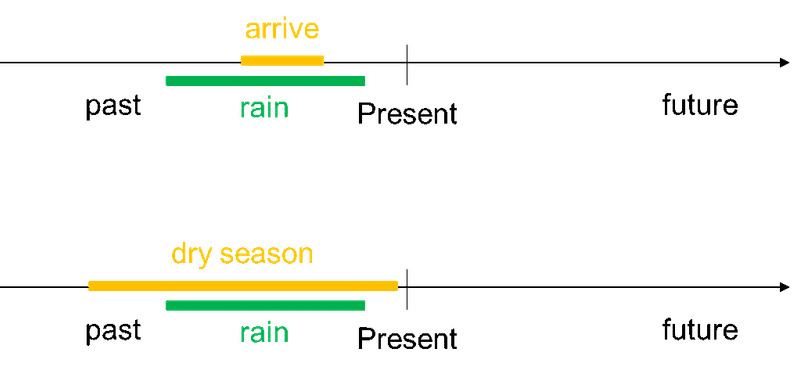What happened depends on our perception
I feel like time is passing along a one-way path, always moving forward. The other day, I was at an airport and walked on a moving walkway. This walkway reminded me that we are all passing through time from past to present, and at that very moment, my present was an advertisement poster that I just passed by. (In actuality, modern physics states that time meanders and is not necessarily a one-way path.)
However, regardless of the language spoken, all humans need to be careful when thinking about time. We frequently use the words that represent the notion of "present", but what does "present" really mean? I became curious as to whether time has a minimum interval and found that one Planck time is 5.391×10^(-44) seconds and represents the time it takes for light to travel 1 Planck length in a vacuum. Following this definition, the "present" at any point in time can be represented by 5.391×10^(-44) seconds.
Consistent with Nicholas Humphrey’s argument (2006), it would be reasonable to assume that our mental representation of "now" encompasses both the present and the short-term future (Figure 1). Actually, in the Japanese language, "now" seems to span a wider range of timepoints than in English. Japanese speakers often use "now" in conjunction with future or past tenses.

Humans construct the concept of "present" spatially
In an experiment investigating perception, a device delivered haptic stimuli to the participants' hands, first to one hand and then to the other (the order was counterbalanced across trials). Participants were asked to report which hand detected the stimulus first. When the participants’ hands were not crossed, a time difference of approximately 70 milliseconds was sufficient for a nearly 100% accurate response. When the participants’ hands were crossed, the correct response a stimulus time difference of over 1 second was necessary for the same accuracy. However, when the difference in stimulus duration was less than 0.3 seconds, participants judged the temporal order of the stimulus presentations as reversed. The spatial arrangement of the hands altered participants’ judgement of the temporal order of the stimuli (Yamamoto & Kitazawa, 2001) . The authors concluded that signals from external organ receptors can only be perceived in the correct temporal order when they are associated with the appropriate spatial position. This experiment demonstrated that the temporal order of events is created mentally, not physically.
An event can be interpreted either as a single event, or as a period of time
A thought that occurred to me is that we mentally map events that occur along the axis of. The Spanish language has two types of past tense: "imperfect past tense" and "simple past tense". The "simple past tense" denotes actions or events that took place at a singular point in time. Conversely, the "imperfect past tense" is used for contexts that took place over a longer period. Of course, English has similar expressions to convey imperfect and simple past tense as well. If you want to emphasize that a verb denotes a context lasting over a period, you can use a phrase like “it was raining”. On the contrary, when you want to express “raining” as a singular event, you can use phrases like “it just rained.” Using these phases, you can tell event and context. However, from a linguistic perspective, when we say that a language has a past tense, it means that the verb has a past form, which is a conjugated version of the original verb. We do not consider a language to have a past tense when we have to express the past tense solely by combining several words. Following this definition, unlike Spanish, English only has one past tense.
Those of us who are not native Spanish speakers may sometimes struggle to clearly distinguish between these two past tenses. If we want to say in Spanish, “When I was 5 years old, my sister was born", we would conjugate the former verb "I was" into the imperfect past tense and the latter verb "was born" into the simple past tense. "When I was 5 years old" provides the context in which the specific event, “my "sister's birth," occurred.
Is it possible, then, that the same event can be represented either by the imperfect past tense or the simple past tense, depending on the context? "When we arrived at the town, it rained heavily. (Llovía bastante cuando llegamos a la ciudad.)" can be expressed as "When we arrived at the town (simple past tense), it rained heavily (imperfect past tense)." But how would we represent "When it was the dry season, it rained heavily" in Spanish? In this sentence, the dry season provides the context and "it rained heavily" is the event. The temporal duration of the rain is the same in these examples. Whether it should be represented as context or event depends on our perception and whether that event is the focus of our expression, or the background (Fig. 2).

It is not necessarily correct to combine imperfect past tense and simple past tense in the same clause. Take the sentence "Me gustaba este libro cuando era pequeño" (When I was young, I liked this book) as an example. In this sentence, both verbs are in the imperfect past tense because my liking for this book was not limited to a singular event but spanned over a long period during my childhood.
Time is not a straight one-way path, either physically or mentally. Chomsky (2002) argued that human languages across the globe all exhibit a universal grammar and might be perceived as a uniform language by extraterrestrials. However, it is remarkable how each language possesses such distinctive characteristics.
Reference
Humphrey, N. (2006). Seeing red: A study in consciousness. Harvard University Press.
Yamamoto, S., & Kitazawa, S. (2001). Reversal of subjective temporal order due to arm crossing. Nature neuroscience, 4(7), 759-765.
Chomsky, N. (2002). Syntactic structures. Mouton de Gruyter.
この記事が気に入ったらサポートをしてみませんか?
